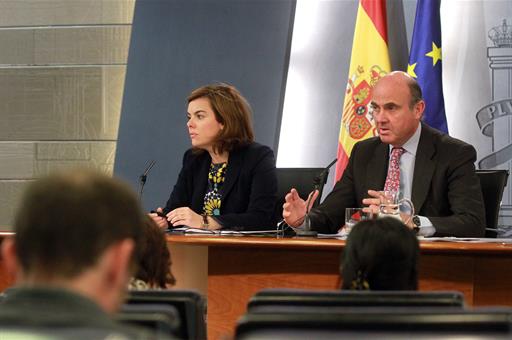Council of Ministers
Council of Ministers improves corporate governance of companies
Council of Ministers - 2014.5.23
Moncloa Palace, Madrid
The Council of Ministers approved, for submission to Parliament, the Draft Law modifying the Capital Companies Act that seeks to improve the corporate governance of companies. The new legislation, which was presented by the government on 13 December 2013, incorporates the proposals from the committee of experts on the matter, as well as other proposals included during the period of public consultation, highlighted the Vice-President of the Government, Soraya Sáenz de Santamaría, and the Minister for Economic Affairs and Competition, Luis de Guindos.
Luis de Guindos announced that the amendments introduced under the new legislation affect "both listed companies and unlisted companies", although they are stricter for listed companies.
 Pool Moncloa
Pool Moncloa Most significant new features
The minister pointed out that the general shareholders'' meeting will be responsible for remuneration policy instead of the board of directors, and more decision-making power will be given to minority shareholders to regulate potential conflicts of interest. Director remuneration must be in line with the economic situation of the company and seek the maximum return in the medium and long term. All companies will have to approve the maximum amount of annual remuneration and said amount may not be modified without authorisation from the general meeting.
The minister stated that for listed companies, the remuneration policy must be approved by the general meeting at least once every three years, and will include the maximum amount of annual remuneration of the board as a whole, as well as the fixed annual remuneration and variable remuneration of executive directors. Any modification thereto will require the approval of the general shareholders'' meeting.
The share capital necessary for minority shareholders to exercise their rights will be reduced from 5% to 3% for listed companies. Similarly, the maximum number of shares required to attend the general meeting will be reduced from 0.1% to 1,000.
As regards the board of directors, Luis de Guindos remarked that directors of listed companies may hold the post for a maximum term of four years instead of the current six years. When the post of chairman and CEO fall on the same individual, this must be approved by at least two-thirds of the board. Furthermore, the board is responsible, on a mandatory basis, for the risk management and control policy, including taxation, and it must present an annual report that defines the fiscal strategy of the company.
In order to guarantee a balanced presence of men and women on the board of directors, a committee will establish the target representation of the least-represented gender. Furthermore, in procedures for the selection of board members, the appointment of women will be encouraged.
On another note, the minister stated that all companies will have to publish the average term for supplier payments in their annual reports and on their web pages. If this period exceeds the maximum established in the regulation on late payments, the company will be obliged to explain the measures it will adopt and instruments it will use to reduce said average term and adapt it to the maximum term permitted by law.
Assessment of the economic situation
 Pool Moncloa
Pool Moncloa The government positively assessed the improved credit rating of Spain''s sovereign debt announced on Friday by the agency Standard & Poor's, in the same way as the latest revisions made by the agencies Moody's and Fitch.
The Minister for Economic Affairs and Competition remarked that the decisions taken by these ratings agencies will help encourage "a good number of institutional investors" - particularly in the Asian markets where investments are based on these indicators - to invest in securities issued by the Spanish Treasury.
Along the same lines, he predicted that the improved rating will have repercussions in areas of the public administration and in important companies "that make issues on the financial markets and for which these ratings are an important reference".
Luis de Guindos highlighted that the ratings agencies base their ratings on the improved outlook of economic growth in Spain, which will have repercussions on employment and the public deficit, as well as help improve competitiveness.
In this regard, he recalled that Standard & Poor's forecast average growth for Spain of 1.6% in 2014 and 2015, a forecast which is even better than that set out by the government in its Stability Programme. He also highlighted that this agency has forecast that, for the first time since the introduction of the Euro, Spain will have a foreign trade surplus and is a competitive country.
Other agreements
 Pool Moncloa
Pool Moncloa According to the Vice-President of the Government, the Council of Ministers has adopted "important measures" to help drive industry.
From the report presented by the Minister for Industry, Energy and Tourism, José Manuel Soria, on the data on the Industrial Production Index, it can be concluded that there has been an improvement in industrial activity in the last year, which went from a fall of 4.1% year-on-year in 2013 to an increase of 1.3% in the final quarter of the year.
It would also seem that this improvement is being consolidated in 2014, underlined Soraya Sáenz de Santamaría.
In an attempt to support industry, particularly the private maritime sector, and Navantia in particular, the Council of Ministers has adopted two agreements. The first is aimed at developing the programme for two maritime action vessels - the so-called BAM - that will affect both the shipyards in Ferrol and those in Cadiz, and the second facilitates the execution of the works corresponding to the fourth major overhaul of the submarine Tramontana S74, an order that will be placed with the shipyard in Cartagena.
Current affairs
 Pool Moncloa
Pool Moncloa The Vice-President of the Government reported that the results of the elections to the European Parliament will not be announced before 11pm on Sunday, due to a change in Italian legislation resulting in the polls not closing until this time. The elections are to be held between 22 and 25 May, but no State will announce any results until the polling stations have closed in Italy, commented Soraya Sáenz de Santamaría.
The Vice-President of the Government expressed her "outright and unmitigated condemnation" of the attack on Cristóbal Montoro and said that "there is no place for violence of any form in a democracy". She asked for "the aggressors not to be confused with society as a whole", since, in her opinion, this is a small minority.
As regards the possibility of former minister Arias Cañete becoming a European Commissioner, she pointed out that we should not get ahead of ourselves and that "Spain''s interests will prevail" in any negotiation process with the EU.
In response to a question on the possible expulsion from Germany of Spanish residents there that lose their job, she expressed her certainty that Germany will comply with the legislation and guidelines on the free movement of EU workers.
As regards the judicial criticism of the reform of the universal jurisdiction, Soraya Sáenz de Santamaría recalled that in a system with the separation of powers, parliament approves the laws, the executive enforces them and the judiciary must apply them.
Regarding the idea that a reduction in the tax brackets of the future Personal Income Tax will benefit those on the highest incomes, the Minister for Economic Affairs and Competition, Luis de Guindos, clarified that "an assessment cannot be made of the progressive nature of Personal Income Tax based solely on tax brackets".





